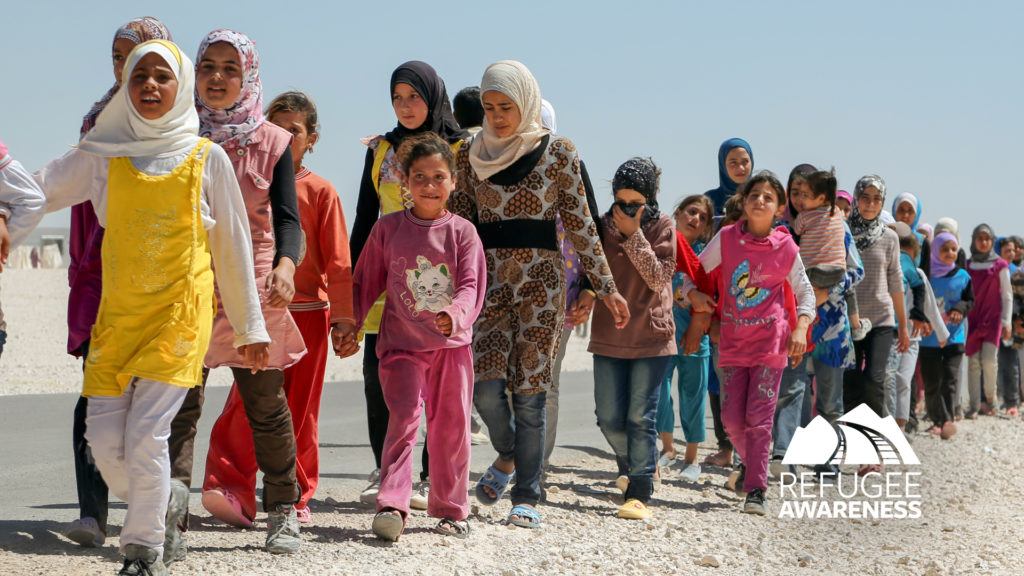
WASHINGTON (BP) – President Biden again has set a refugee resettlement ceiling of 125,000 for the next year despite an expectation this year’s admissions will fall 100,000 short of that goal.
The White House announced Tuesday (Sept. 27) the admissions cap for refugees in the 2022-23 fiscal year, which begins Oct. 1. It appears the United States will resettle fewer than 25,000 refugees under the ceiling of 125,000 established for this fiscal year, based on the number of admissions during the first 11 months of 2021-22.
The announcement of Biden’s latest admissions ceiling came four days after the Southern Baptist Ethics & Religious Commission (ERLC) and seven other organizations in the Evangelical Immigration Table (EIT) wrote the president and congressional leaders with a plea for them to rebuild the country’s refugee resettlement program, which has experienced record lows in recent years. In that Sept. 23 letter, they urged Biden to set a ceiling of 125,000 for the next year as a step in rebuilding the program.
“America has always been known as a refuge for those fleeing religious persecution or for their very lives,” ERLC President Brent Leatherwood said in an EIT release. “But, for too long now, our refugee resettlement program that aids these individuals and families seeking safety has languished.”
The United States has permitted “unrelated crises and political turmoil to hamper” the program’s rebuilding, and this “must not continue,” he said.
Hannah Daniel, the ERLC’s policy manager, welcomed renewal of the 125,000 refugee cap but said “much work remains to be done.” She described resettlement of only about 20 percent of this year’s cap at a “time of historic displacement” in the world as “unacceptable.”
“This action will be largely symbolic unless the United States invests the necessary resources to rebuild its resettlement infrastructure into the robust, nimble program that is needed to meet this moment,” Daniel told Baptist Press in written comments.
More than 27 million people around the world are refugees of a total of 89.3 million people who are forcibly displaced, according to a June report by the United Nations High Commissioner for Refugees (UNHCR). The number of those forcibly displaced – people who fled their homes because of “conflicts, violence, fear of persecution and human rights violations” – is the most since World War II and more than twice as many as 10 years ago, UNHCR reported.
The Russian invasion of Ukraine in February and the Taliban takeover after the U.S. departure from Afghanistan in August 2021 have resulted in millions of people leaving their homes in those countries.
Only 11,411 refugees were admitted to the United States in the fiscal year ending September 2021, marking the fewest refugee admissions since the 1980 enactment of a law establishing the Refugee Resettlement Program. The previous low was 11,814 in the year ending in 2020.
President Trump established four years of record lows that saw the refugee admissions ceiling fall from 45,000 in the 2018 fiscal year to 15,000 in 2021. Biden set a revised cap of 62,500 for last year, but the number of admissions fell far short.
In their letter, the EIT organizations said the United States should be the world’s leader in refugee resettlement during a “time of unique global crisis.”
Reaching the cap of 125,000 refugees in the next year “will require ramping up overseas processing and eliminating inefficiencies,” they wrote. While maintaining the “thorough vetting process” of the program, “we also need processes nimble enough to respond to emerging crises as well as protracted refugee situations,” according to the letter. Some refugees have had “to wait literally decades in refugee camps and other inadequate conditions,” they said.
The EIT organizations called for continued help for at-risk Afghans and Ukrainians, but they also urged Biden and congressional leaders “to ensure the U.S. offers similar protections to those fleeing persecution in other contexts that have received less media attention.” The letter acknowledged the “unique dynamics” in the last year that resulted in the arrival of many from Afghanistan and Ukraine in this country by legal means other than the refugee admissions program.
In addition to the ERLC, the EIT organizations that signed the letter to the president and congressional leaders were the National Association of Evangelicals, World Relief, National Latino Evangelical Coalition, World Vision, Council for Christian Colleges and Universities, Bethany Christian Services and The Wesleyan Church.
The United Nations has defined a refugee as “someone who is unable or unwilling to return to their country of origin owing to a well-founded fear of being persecuted for reasons of race, religion, nationality, membership of a particular social group, or political opinion,” according to its 1951 Refugee Convention.
A Lifeway Research survey released Tuesday showed 73 percent of Americans who are evangelical Christians by belief agree the United States has a moral responsibility to admit refugees. EIT and World Relief sponsored the public opinion poll.
Messengers to this year’s SBC meeting in June approved a resolution regarding the war in Ukraine that called on the U.S. government to make the admission of Ukrainian refugees a priority. At the 2016 SBC meeting, messengers adopted a resolution that urged Southern Baptist “churches and families to welcome and adopt refugees into their churches and homes as a means to demonstrate to the nations that our God longs for every tribe, tongue, and nation to be welcomed at His throne.” Messengers to the 2018 meeting reaffirmed that resolution.
Care for refugees is one of the focus areas of Send Relief, the Southern Baptist Convention’s compassion ministry carried out through the cooperative efforts of the North American Mission Board and International Mission Board. Send Relief encourages churches to proclaim the Gospel while meeting practical needs.





















